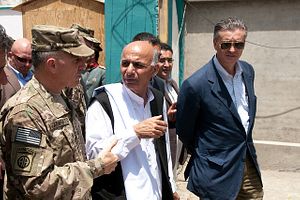More than six months into his tenure, Afghan President Ashraf Ghani is possibly as far from achieving a breakthrough with the Taliban – both militarily and at the negotiating table – as he was on his first day in power. At his inauguration ceremony, Ghani, while keeping the military option open, invited the Taliban to join the political process and to resolve the conflict through negotiations.
This two-pronged approach towards the Taliban was followed by Hamid Karzai as well. Just like his predecessor, Ghani too is facing problems on both fronts.
Ghani’s courting of Pakistan is, however, a departure from Karzai’s policy in his last few years in office. Afghanistan has undertaken military operations against Tehrik-i-Taliban Pakistan (TTP) bases on Afghan soil, handed over a top TTP commander, and even withdrawn its request for arms from India. All these concessions, made in the hope of reciprocity from Pakistan, are calculated risks.
Pakistan has offered assistance with the reconciliation process, but to date progress has been inadequate. Afghan government officials have conceded that they have had no access to the Taliban. This should be concerning for Ghani, as he has invested significant political capital in reaching out to Pakistan despite immense domestic opposition.
Given the prevailing mistrust and bitterness towards Pakistan in Afghanistan, Ghani’s efforts have unsurprisingly raised concerns back home. His critics point out that Pakistan has failed to deliver on similar promises in the past. Reported measures such as the proscription of groups like the Haqqani Network have been rejected as image building efforts rather than a reflection of Rawalpindi’s sincerity. Only a more genuine and concerted effort to uproot the terror infrastructure on its soil is likely to change the existing perception of the Pakistan military among Afghans.
While it is easy to criticize Rawalpindi, its failure to bring the Taliban to the table could possibly be a reflection of its limited influence over the group and a bigger obstacle to the talks may be the Taliban itself.
The Taliban is not a homogeneous organisation nor is there any unanimity towards the peace talks. Although Mullah Omar, still the supreme commander of the Taliban, and the Quetta Shura are said to be in favor of the peace talks, there are a number of individual commanders who are not. Omar’s prolonged absence from the public space has made it difficult for the leadership to keep the flock together. It is unclear how representative the Quetta Shura is of the entire movement or whether it is capable of imposing its will on the opposing factions. The arrival of the Islamic State in the region – underscored with a major attack over the weekend – also complicates the situation as it provides an alternative for the disenchanted and disenfranchised Taliban commanders who differ with the Quetta Shura and who may not be willing to accept any agreement with the government.
These internal differences aside, reaching any sort of agreement with the Taliban is still going to be difficult. The Taliban continues to view themselves as the legitimate rulers of the country and the existing democratic system in Afghanistan as an illegal imposition by the West controlled by Washington. Given this self-perception, the Taliban, if and when it comes to the negotiating table, is unlikely to back down from its core demands – complete withdrawal of foreign forces, release of Taliban prisoners, and a rewriting of the Afghan Constitution to something more in tune with Sharia – that are not acceptable to Kabul. Therefore, it is unlikely that the conflicting interests of the two parties can be reconciled without some form of compromise from both sides.
Military Balance
The military balance on the ground between the two may ultimately determine their bargaining strength during negotiations. The existing military stalemate is unlikely to favour any one side significantly. The Taliban remains resilient and has made significant inroads into southern and eastern Afghanistan. The Afghan National Security Forces (ANSF) are capable of holding their own against the insurgents in the upcoming fighting season, but may not be in a position to inflict lasting damage upon the insurgency.
The U.S. President Barack Obama’s decision to re-evaluate his drawdown plans from the region and commit military aid to Afghanistan ANSF through 2017 has come at an opportune time for Ghani. The U.S. will also provide air support and other logistical assistance to the ANSF boosting its position against the Taliban during the spring and summer offensives.
The recent U.S. commitments should not be understated. However, the impact of the residual force remains to be seen, especially since foreign troops were unable to make a significant dent on the insurgency, even at the height of the U.S. surge. Moreover, with no change in Obama’s plan to completely withdraw from the country by 2017, the Taliban, having survived thirteen years of NATO operations, needs to wait it out only for a few more years. Time continues to be on the Taliban’s side.
Aryaman Bhatnagar is an Associate Fellow at Observer Research Foundation.

































